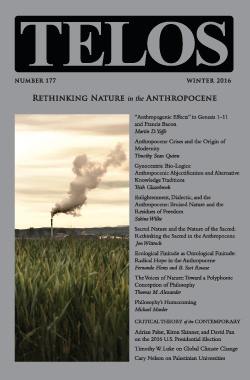The vulnerability we confront in the Anthropocene is what Jonathan Lear has called ontological vulnerability: the possible collapse of our world, that is, the collapse of the taken-for-granted way of life that guides and orients us in our everyday practices. In this paper, we take up Lear’s claim that in the face of the impending collapse of one’s world, a peculiar form of hope, radical hope, is called for. According Lear, radical hope means holding on to a “commitment only to the bare possibility that, from this disaster something good will emerge.”
|
The term “Anthropocene” designates the present age of the world, dominated and transformed by human activity. It is therefore an age of crisis, whose central features include not only technological exploitation of the earth, but also a loss of faith in any order, natural or supernatural, that could serve as a guide to human affairs. In this essay, I wish to argue, first, that the roots of this crisis rest with the modern concept of nature, a concept of nature that, as Hans Jonas wrote, “contained manipulability at its theoretical core.” Telos 177 (Winter 2016) is now available for purchase in our store. |
||||
|
Telos Press Publishing · PO Box 811 · Candor, NY 13743 · Phone: 212-228-6479 Privacy Policy · Data Protection Copyright © 2025 Telos Press Publishing · All Rights Reserved |
||||



